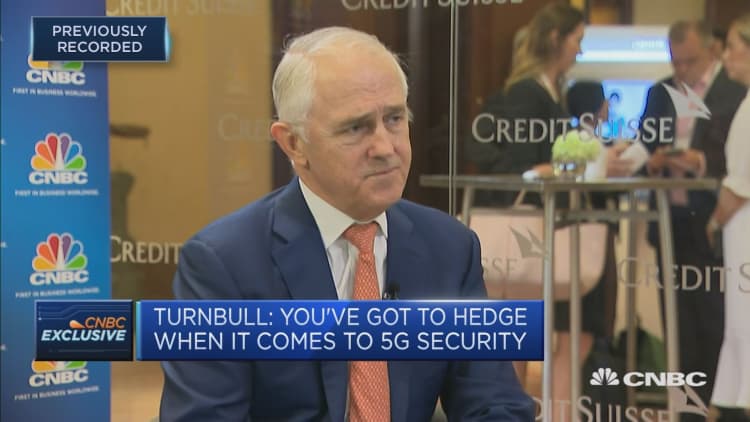Huawei has faced mounting political pressure in recent months as the U.S. asks allied countries to block Huawei from being a part of next-generation mobile networks known as 5G.
Washington has accused the Chinese telecom equipment maker of being a national security risk, alleging its gear could be used by Beijing for espionage. Huawei, meanwhile, has repeatedly emphasized that it would never allow its hardware to support spying efforts.
5G networking technology promises super-fast download speeds on devices, but it is also seen as a key piece of infrastructure that will be able to support new data-heavy technologies like driverless cars.
The American pleas to other countries to bar Huawei from those networks have seen mix results. Here's how some of the world's major economies have responded and how they view Huawei.
The US
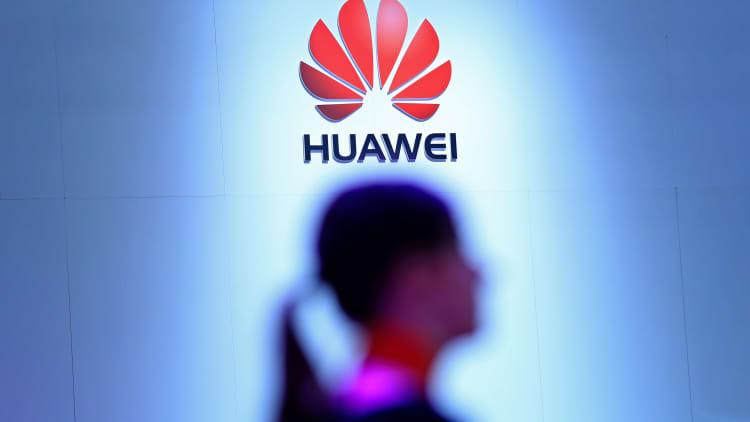
Huawei has been absent from the U.S. market for many years, and the U.S. government has been public about its suspicion of the Chinese firm for some time.
In 2012, the U.S. House Intelligence Committee released a report in which it said equipment from Huawei and rival ZTE could "undermine core U.S. national-security interests."
Washington has stepped up criticism and actions against the company in recent times. Huawei had planned to release a flagship smartphone in the U.S. through a partnership with telecoms firm AT&T last year. However, that deal fell apart reportedly because AT&T was urged by the U.S. government not to go through with it because of security fears.
Then in December of last year, Huawei CFO Meng Wanzhou, who is also the daughter of founder Ren Zhengfei, was arrested in Canada at the request of the U.S. She has been accused of fraud linked to violations of American sanctions on Iran. Meng has denied those allegations.
U.S. government agencies are banned from buying Huawei gear. The Chinese technology giant has tried to fight back. In March, Huawei filed a lawsuit against the U.S. claiming a piece of legislation that prevents government agencies buying its equipment is unconstitutional.
Huawei's founder has also been very vocal in recent months on the issue. Ren told CNBC in a recent interview that the U.S. was "scared" of Huawei.
The European Union
The EU's response to Huawei so far has been divided with individual countries making their own decisions and the bloc's institutions trying to come up with a unified policy.
The European Commission issued recommendations in March around 5G security. The EU's executive arm said that member states should carry out a cybersecurity risk assessment on their own nation's network, which would eventually lead to a bloc-wide assessment later in the year. The idea is to come up with a list of risks and ways to mitigate them.
While those are not legally binding recommendations, the Commission hopes it will lead to national legislation regarding 5G rollouts.
The EU did not name Huawei in its recommendations and has not put a ban on the company in the bloc.
Japan
Japan effectively banned Huawei and other Chinese companies from public procurement in December. The government did not name Huawei specifically in its guidelines, but warned telecommunications operators not to use equipment that could carry security risks.
SoftBank Group, NTT Docomo and KDDI, Japan's three main mobile carriers, have decided not to use Huawei equipment in the rollout of 5G, according to the Nikkei Asian Review.
Huawei was part of some 4G networks in Japan. SoftBank, one of the firms that used Huawei's 4G gear, is looking to replace it with equipment made by other vendors.
Germany
Germany will not ban Huawei from participating in the country's 5G networks, according to the country's telecommunications regulator.
Jochen Homann, president of regulator the Bundesnetzagentur, told the Financial Times in a recent interview that no equipment suppliers, including Huawei, "should, or may, be specifically excluded," adding that he has yet to see evidence that the company poses a security risk.
Homann said Huawei could participate in the 5G rollout if it complies with all the security requirements.
Media reports in February suggested that German Chancellor Angela Merkel was seeking a deal with China not to spy on each other. The idea was backed by Huawei's founder Ren Zhengfei in an interview with CNBC.
"We endorse unified global standards that make installing backdoors a crime ... we want to sign such an agreement because we think it's the right thing to do," Ren said of the potential "no-spy" deal.
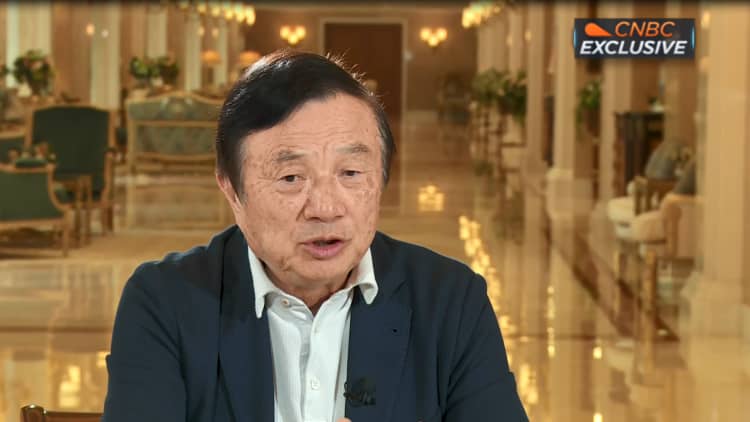
The UK
Huawei will be allowed to participate in limited parts of the U.K.'s 5G networks, according to the Guardian and Telegraph newspapers.
The two media outlets reported that Britain's National Security Council, which is chaired by Prime Minister Theresa May, will allow Huawei to sell equipment to British carriers for "non-core" parts of the network.
A 5G network is made up of a "core" and radio access network (RAN). The latter part is the equipment that allows any device to hook up to the 5G network. Experts suggest that keeping Huawei out of the core could be one way to mitigate any security risk.
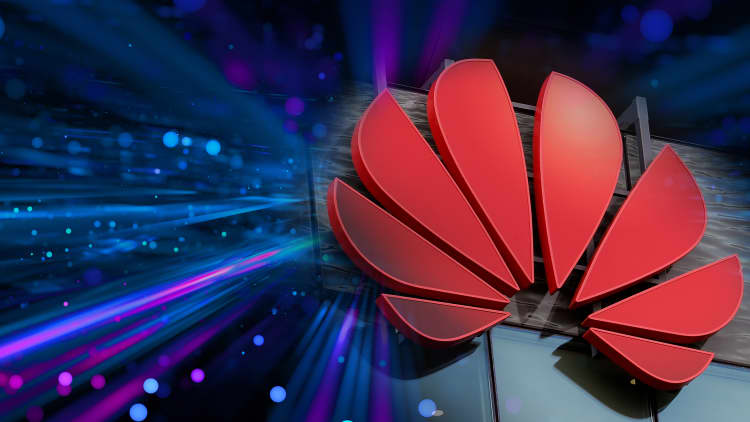
Mobile operators in Britain have warned that an outright ban on Huawei could hurt their businesses. Vodafone said such a move would cost it hundreds of millions of pounds and "very significantly" slow down the rollout of 5G. Huawei, meanwhile, has been involved in the British 4G networks.
Still, the U.K. has some concerns about Huawei. In March, a government-led oversight body created to vet Huawei gear, said that a previously reported software issue had not been fixed. It added there were "underlying defects" in the company's software engineering and cybersecurity processes which create a "significantly increased risk to U.K. operators."
India
India has not made up its mind on Huawei yet. It has invited the company, along with rivals Nokia and Ericsson, to conduct 5G trials in the country.
However, the Nikkei Asian Review reported in March that the government was looking to restrict Huawei's participation in 5G without looking to single the company out.
France
Huawei is not banned from selling 5G equipment in France.
However, the country's lawmakers are currently debating a bill which would implement strict tests to find out whether a vendor's network equipment poses a security risk.
One article in the bill proposes giving the French prime minister power to block manufacturers deemed to be subject to interference from a state that is not a member of the European Union.
In an interview with French news organization La Tribune translated by Euractiv, Eric Bothorel, a key lawmaker behind the proposed legislation, said that article "does not only target equipment from Asian countries."
Brazil
U.S. officials warned the Brazilian government about their concerns over Huawei, Reuters reported in March. However, Huawei has not been banned or restricted.
Italy
Italy said in February that it would not make a move to block Huawei or ZTE from participating in 5G networks despite an earlier report that it would do so.
Canada
Canada has not yet made a decision about Huawei, but is continuing to weigh the risks. Canadian Public Safety Minister Ralph Goodale has repeatedly said in the press that there is no timeline for when a decision will be made.
Canada has been caught in the middle of the spat between the U.S., China and Huawei. In December, Canadian authorities arrested Huawei CFO Meng at the request of the U.S. government. In seemingly retaliatory moves, China arrested a number of Canadian citizens.
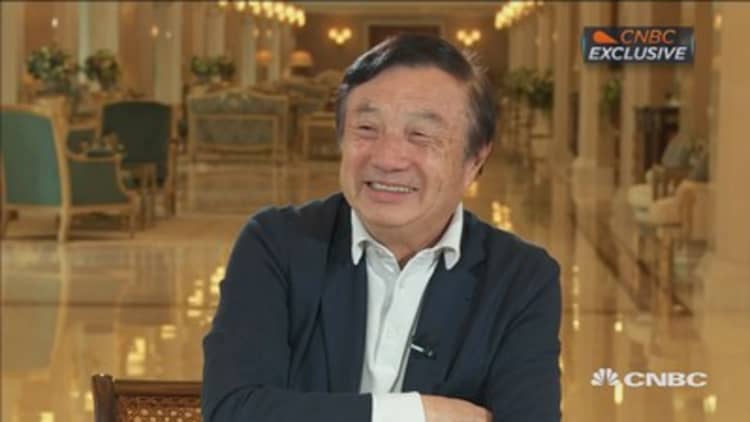
South Korea
South Korea is among one of the first countries to roll out a commercial 5G network as it looks to take a lead in the next-generation technology. The government has left the choice of network equipment vendor up to individual carriers.
KT and SK Telecom, two major mobile networks in South Korea, do not use Huawei equipment for their 5G networks.
However, LG Uplus, another cellular network that is run by South Korean electronics company LG, does use Huawei equipment.
Australia
In August 2018, Australia banned Huawei and ZTE from participating in the country's 5G networks.
That move came under the tenure of former Australian Prime Minister Malcolm Turnbull, and he explained why his government made that decision in a recent interview with CNBC.
"Now, the company, the entity that provides that, that maintains it, that has constant access to it, has enormous capability, if it chose to do so, to act adversely to your interest," Turnbull said about firms that sell 5G equipment.
"No one is suggesting that Huawei would do that, certainly not me. I have great admiration for the company," he said. "But, capability takes a long time to put in place. Intent can change in a heartbeat, so, you have got to hedge and take into account the risk that intent can change in the years ahead."
Turnbull highlighted a key nuance — that Huawei hasn't done anything wrong but there is a risk of of something bad happening if intentions change.
